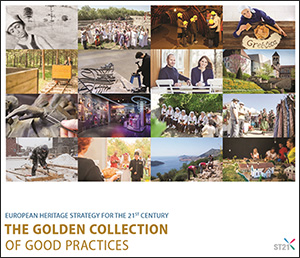Location of the initiative:

Relation to Strategy 21 Recommendations:
Time span of the initiative:
Start Date: 2011 / End Date: 2020
Motivation / Methodology
Municipalities have a crucial role in safeguarding, protecting and managing cultural heritage through the Planning and Buildings Act, but also have responsibilities and roles as community developer, in facilitating local involvement and participation, balancing use and protection of heritage against other interests and need, and using tools, instruments and means across sectors in the best interest of their community.
Norwegian municipalities differ in size and number of inhabitants, but share some common challenges in the management of cultural heritage:
· They lack sufficient knowledge in archives and mapping of cultural heritage, and of local heritage in general
· The field of cultural heritage is not given sufficient attention and anchored politically, many municipalities lack an overview of the local heritage and have no priorities of sites or monuments, nor of tools, instruments and means to protect, manage or use them. Some of the consequences of this is unnecessary loss of cultural heritage, inefficient and unpredictable planning processes and negative perceptions to heritage among property developers, business developers etc.
· Many municipalities benefit from the competence in local museums, associations, volunteers, enthusiasts or owners – and of high interest and engagement for local history and heritage.
In 2011, the Directorate for Cultural Heritage launched a programme to support municipalities in strengthening local competence and capacity building through the production of heritage plans. The objectives were:
· To strengthening the democratic base of the heritage field in communities
· To highlight and strengthen cultural heritage as a political field in the municipalities
· To build strengthen local competence and capacity through cooperation models, networks and knowledge sharing
· To provide documentation, mapping, overviews and priorities of local heritage through the adoption of local heritage plans
· To encourage, facilitate and promote public participation in mapping, documenting and sharing of knowledge on local history and heritage
The programme has been built on the following elements:
Economic incentives to produce the local heritage plan was granted to every municipality that had a political decision to do so
Economic incentives to municipalities that explored cooperation models, for instance between museums and the municipality, inter- municipality-cooperation or between associations and municipalities
Establishing networks and arenas for knowledge sharing, with a particular focus on strengthening the role of the regional heritage administration (politically autonomous in Norway)
Providing guidance and knowledge though established network and arenas (for instance national association for planners, national association for local cultural workers); through web-pages and publication of guidelines and step-by-step- guides.
Implementing a trial-scheme between 2014-2016 for the establishment of 11 new city antiquarian positions from 2014-2016.
As of 2019, 90 % of 422 Norwegian municipalities are currently working on a local heritage plan or have recently adopted one.
Obstacles / Barriers
In 2015, we commissioned a half-term evaluation of the programme. The evaluation pointed at the following:
· There is an enormous interest in local heritage and history in the municipalities, also independent of the economic situation of the municipality
· The economic incentive from the national level was important to start the work on the local heritage plan
· The preparation of the plan takes 2-4 years, especially if this is the first generation of such a plan
· It is advised not to be too ambitious in the preparation of the plan – a lot of work can and should be done as part of the implementation, follow-up or re-consideration of the plan. Start the work with summarising existing knowledge and make a plan for supplementing documentation etc.
· Local participation is crucial to the work. When and how to involve associations, owners and the civic society in general needs to be carefully considered when planning the process.
· Anchoring and organisation of the project in the local administration is of importance – whether it is the cultural or planning department that own the process
Change / Impact
These are some of the effects of the programme we have registered so far:
· Raised awareness, engagement and participation in local community in heritage issues – we see a huge effect in building and strengthening public opinion in this field, for instance through newspaper articles and coverage, social media, applications for grants from the Heritage Fund etc.
· The municipalities are more capable, aware and willing to take their responsibility and role in management - thus leading to better protection, enhancement and safeguarding of cultural heritage
· an increased quality of life for people and communities - also as a result of municipalities that use heritage as a resource in recreation (such as historic trails) and public health, for development purposes (such as tourism) or in education
· the building of a stronger civic society through participation and engagement
Lessons learned
Lessons learned regarding the effects of the project:
Local participation and ownership is essential
· Economic incentives are important
· Definition of time frame and ambitions are crucial
· Competence and organisation in the municipal administrations matter
Lessons learned regarding other effects:
· People are concerned and engaged in local cultural heritage and are happy to be invited and to contribute
· The local political engagement is strong
· Heritage matter for identity, social cohesion and local development - and heritage plans give municipalities and inhabitants tools and arenas to act upon
· Local heritage plans are important to strengthen the protection and the use of heritage
Online resources
- https://www.facebook.com/riksantikvaren/
- https://www.instagram.com/riksantikvaren_offisiell/
- https://twitter.com/Riksantikvaren
Contact information
Kari Larsen
Directorate for Cultural Heritage
[email protected]
https://www.riksantikvaren.no/en/
Source of financing
Public





